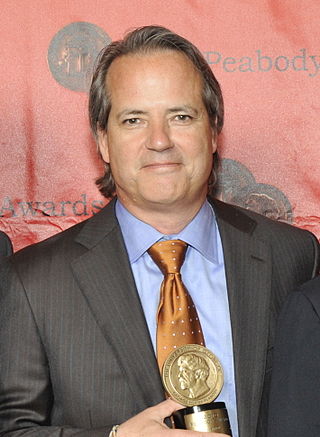Related Research Articles
TVO, formerly known as TVOntario, is a publicly funded English-language educational television network and media organization serving the Canadian province of Ontario. It operates flagship station CICA-DT in Toronto, which also relays programming across portions of Ontario through eight rebroadcast stations. All pay television providers throughout Ontario are required to carry TVO on their basic tier, and programming can be streamed for free online within Canada.

Steven Hillel Paikin is a Canadian journalist, author, and documentary producer. Paikin has primarily worked for TVOntario (TVO), Ontario's public broadcaster, and is anchor of TVO's flagship current affairs program The Agenda with Steve Paikin.
The Humber College Institute of Technology & Advanced Learning, commonly known as Humber College, is a public College of Applied Arts and Technology in Toronto, Ontario, Canada. Founded in 1967, Humber has three main campuses: the Humber North campus, Carrier Drive campus, and the Lakeshore campus.

McClelland & Stewart Limited is a Canadian publishing company. It is owned by Penguin Random House of Canada, a branch of Penguin Random House, the international book publishing division of German media giant Bertelsmann.

TFO is a Canadian French language educational television channel and media organization serving the province of Ontario. It is owned by the Ontario French-language Educational Communications Authority (OTELFO), a Crown corporation owned by the Government of Ontario and operating as Groupe Média TFO. It is the only French-language television service in Canada that operates entirely outside Quebec. The network airs cultural programming, including blocks of French-language children's programs, along with original series, documentaries, and films.

Graham John Yost is a Canadian film and television screenwriter. His best-known works are the films Speed, Broken Arrow, and Hard Rain and the TV series Justified.
Christine Moya McGlade is a Canadian digital designer and strategist, executive, and professor, as well as a former television producer, and children's television host.

Richard John Philip Jermy Gwyn was a Canadian journalist, author, historian, and civil servant.
Imprint was a Canadian television series that aired on TVOntario, CBC Newsworld, BookTelevision and Knowledge. Inspired by Bernard Pivot's French literary programme Apostrophes, the series featured interviews with prize-winning authors and journalists, and examined the latest trends in books and contemporary issues in literature.
Tina Srebotnjak is a Canadian radio and television journalist.
Bruce Rogers is a Canadian broadcast journalist, author and political candidate. Rogers is best known for his work as a television host on TVOntario and as a radio broadcaster on CBC Radio and CFRB in Toronto. Rogers worked from the Canadian Broadcasting Corporation from the 1960s through the 1980s and was the first host of CBC Radio Toronto's Metro Morning from 1973 to 1974. He also hosted Radio Noon, Sunday Magazine, The World at Six as well as numerous hourly news bulletins. On television, he hosted CBLT's The Rogers Report as well as various newscasts. His work on TVO has included hosting a number of finance-oriented shows such as Money$worth and Money$ense.

Humber Valley Village is a neighbourhood located in Toronto, Ontario, Canada. It is within the former suburb of Etobicoke and includes some of the most expensive real estate in the metropolitan west end. The boundaries are from Dundas Street on the south to Islington Avenue to the west, Eglinton Avenue to the north, and the Humber River in the east. The neighbourhood is in the political riding of Etobicoke Centre.

Lauren B. Davis is a Canadian writer. She is best known for her novels Our Daily Bread, which was named one of the best books of 2011 by The Globe and Mail and The Boston Globe. and The Empty Room, a semi-autobiographical novel about alcoholism. She currently lives in Princeton, New Jersey with her husband, Ron Davis and their dog, Bailey The Rescuepoo.
Richard Scrimger is a Canadian writer who has published fourteen books since 1996. He is best known for his children's literature, but has also written three books for adults: Crosstown, Still Life With Children and Mystical Rose. A winner of the Mr. Christie Award and recipient of dozens of award nominations, Scrimger is a favourite with many children and adults. All of his novels except The Boy From Earth and Still Life With Children have been short-listed for readers' choice awards. Several of his books have been named to Best-of, or Top-ten, or Notable lists by various libraries and publications, including Young Adult Library Services Association, Chicago Public Library, American Library Association, Time Out New York Kids, The Globe and Mail, Quill & Quire. His books have been translated into Dutch, French, German, Thai, Korean, Portuguese, Slovenian, Italian, and Polish.
Rabindranath Maharaj is a Trinidadian-Canadian novelist, short story writer, and a founding editor of the Canadian literary journal Lichen. His novel The Amazing Absorbing Boy won the 2010 Trillium Book Award and the 2011 Toronto Book Award, and several of his books have been shortlisted for the Rogers Writers' Trust Fiction Prize, the Commonwealth Writers' Prize, and the Chapters/Books in Canada First Novel Award.
William Bradford Freeman is a Canadian writer of historical fiction for young adults, film scripts, documentaries, theatrical plays, educational videos and non-fiction books. He specializes in writing about Canada and the Canadian experience.
Brian D. Johnson is a Canadian journalist and filmmaker, best known as an entertainment reporter and film critic for Maclean's.

Carolyn Bennett is a Canadian comedian and writer.
Marni Jackson is a Canadian journalist. She is most noted for her 1992 memoir The Mother Zone, which was a shortlisted finalist for the Stephen Leacock Memorial Medal for Humour in 1993, and her 2002 non-fiction book Pain: The Fifth Vital Sign, which was shortlisted for the Pearson Writers' Trust Prize for Nonfiction.

Fred Thomas was a Canadian multi-sport professional athlete. He played on semi-professional or professional teams in basketball, baseball, and Canadian football. He was a standout on his college basketball team and is known as one of Canada's finest basketball players. A 2019 profile by TVOntario described Thomas as "the greatest Canadian athlete you've never heard of". He would likely have been more well-known had blacks not been denied opportunities to compete in major professional sports leagues in the 1940s and 1950s.
References
- ↑ "Class of 1974" (PDF). Reigate Grammar School. Archived from the original (PDF) on 13 October 2007. Retrieved 13 May 2018.
- 1 2 Eilenberg, Max (2000). "Obituary". The Independent (London), 27 June 2000.
- ↑ "J! Archive - H. Bhabra" . Retrieved 1 January 2024.
- 1 2 3 4 5 Marni Jackson (5 December 2014). "Author Marni Jackson's story of backstage harassment". Maclean's magazine . Retrieved 30 May 2018.
Then one day when everyone else had left the office he said, "You know Marni, I'm very grateful there's a wall between our offices, because otherwise I should find it difficult not to throw myself at you." (Yes, he really did talk like that.) I felt off-balance. This was not a compliment, I realized, it was more like a threat. I told him that his remarks were inappropriate and asked him to stop.
- 1 2 Curtis Gillespie. "Last Exit". Saturday Night . Archived from the original on 14 February 2004. Retrieved 30 May 2018.
- 1 2 Gayle MacDonald, Alexandra Gill (3 June 2000). "The unseen faces of H.S. Bhabra". The Globe and Mail . Toronto. Archived from the original on 30 May 2018.
'He tells her everything was a lie,' said a friend who read Bhabra's letter. 'He tells her he was not a legal immigrant. That there is no book [the writer was working on a trilogy with Doubleday] no publisher, no money. That he failed at everything and everybody. And that he's sorry, but he has to go.'
- ↑ "Canada's Awards Database". Academy of Canadian Cinema & Television. Archived from the original on 28 September 2011. Retrieved 8 April 2009.